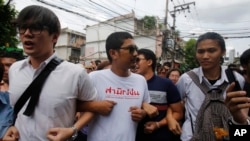A United Nations agency and the European Union mission in Thailand Tuesday called on the country’s ruling junta to release 14 pro-democracy students arrested and charged with sedition.
In a statement the U.N.’s Human Rights Office for Southeast Asia (OHCHR) called for Thailand “to promptly drop criminal charges” against the students arrested June 26 for “peacefully demonstrating in public” the previous day at the Democracy Monument in Bangkok.
The students face up to seven years in prison for defying the junta’s ban on public demonstrations and holding gatherings that oppose the government’s rule.
OHCHR’s statement notes Thailand, as a party to the International Covenant on Civil and Political Rights, “has the obligation to uphold the right to freedom of expression and the right to freedom of peaceful assembly.”
Defends ban
The ruling junta, known as The National Council for Peace and Order, has defended its laws banning political gatherings as necessary for maintaining peace.
But the government’s crackdown has drawn criticism from Western countries, including the United States.
The EU Mission in Thailand called the move to pursue sedition charges against the students a “disturbing development.”
The pro-democracy students are among the few in a small network who have publicly challenged the military rulers who seized power in May 2014.
The bloodless coup – the latest in a long series of such military takeovers in the kingdom – removed the elected government and imposed severe restrictions on civil liberties.
The arrested students are to be tried in a military court, where hearings are closed and there is no right of appeal if convicted.
“Respect for human rights and fundamental freedoms must be upheld, and military courts should not be used to try civilians,” the EU statement said.
The students have demanded to be tried in civilian courts which deputy prime minister Wissanu Krea-ngam declared “impossible.”
July 8 hearing
The next hearing for the students in military court in Bangkok is set for July 8.
The arrested students have taken authorities by surprise in not seeking bail.
"Normally, those who are arrested seek bail, so why do these students not want to get bail?" asked Anusit Kunakorn, the national security council secretary-general, in comments to reporters Tuesday.
A group of 10 people wearing cartoon mask portraits of the arrested students demonstrated outside the U.S. consulate in Chiang Mai Monday.
Authorities said three people were arrested hours later at a nearby café, accused of taking part in the protest, which is an illegal act under the junta’s interim charter.
The U.S. Embassy in Bangkok has not issued a statement specifically concerning last week’s arrests of the students or the pro-democracy rally outside the Chiang Mai consulate.
“We have noted our deep concerns about continued limitation civil liberties in Thailand, such as restrictions on freedom of expression and peaceful assembly, including in our Human Rights Report that was released June 25,” embassy spokeswoman Melissa Sweeney said in an e-mailed response Tuesday to VOA.
“We continue to urge the interim government to remove undue restrictions on freedom of expression and peaceful assembly, fully restore civil liberties, institute a genuinely inclusive reform process that reflects the broad diversity of views within the country, and return the country to democracy,” Sweeney added.
Academics urge release
A group of academics Tuesday appeared in front of the Bangkok Remand Prison, where the students are being held, to read a statement calling for their release, which it said has been signed by 280 university lecturers nationwide.
The Thai coup leader, then-army chief and now-Prime Minister Prayuth Chan-ocha, has maintained the takeover of the government by the military was necessary to restore order and reform Thailand’s deeply polarized political process.
The coup followed months of sometimes violent protests against Prime Minister Yingluck Shinawatra, the sister of telecommunications mogul Thaksin Shinawatra, who was ousted as prime minister in a 2006 coup.
Parties backed by the Shinawatra clan have won every national election since 2001.
The working class in the northern and eastern provinces is loyal to the family, which poured billions of dollars' worth of development into the long-neglected and poor region.
However, the Bangkok elite has vehemently opposed the Shinawatras, accusing them of buying their way into office and not paying sufficient homage to Thailand’s widely revered king.













